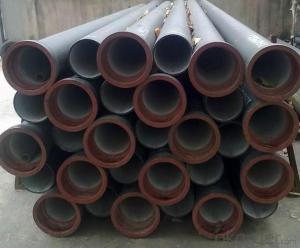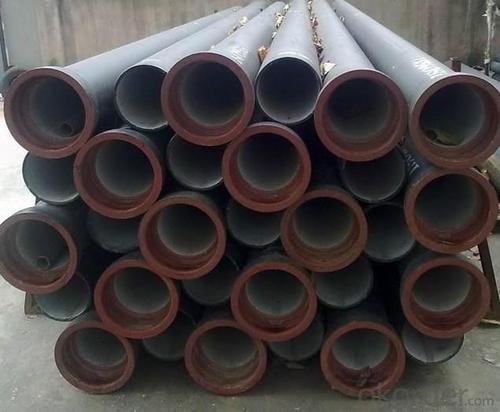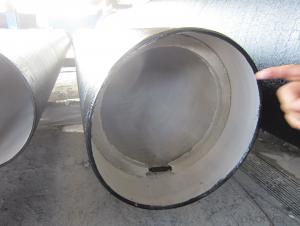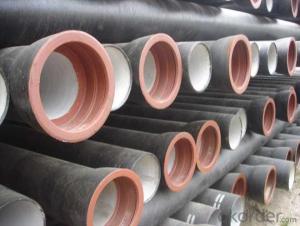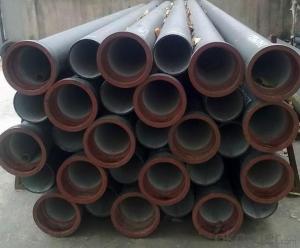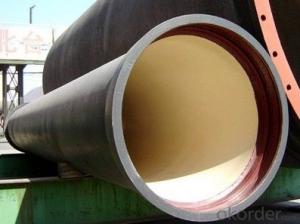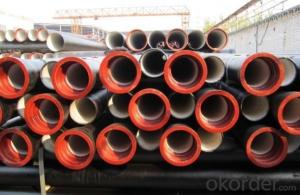Ductile Iron Pipe of China DN800 EN598 Hot Sale
- Loading Port:
- China main port
- Payment Terms:
- TT or LC
- Min Order Qty:
- 25 m.t.
- Supply Capability:
- 100000 m.t./month
OKorder Service Pledge
OKorder Financial Service
You Might Also Like
1,Ductile Iron Pipe Description :
1) Pipes confirm to ISO2531,K9 class,T type joint,6m long,with inside cements lining conform to ISO4179, outside Zinc spraying(130g/m2) and bitumen coating(70μm) conform to ISO8179.
2) Pipe ends: Spigot and socket ends, with 100% SBR rubber gaskets accoding to ISO4633
3) we can do third party inspection according to customer's request.
4) Our products have been sold to many international market, such as Middle East and South East Asia and Africa.
2,Main Features of the Ductile Iron Pipe:
•High yield strength
•High tensile Strength
•High corrosion resistance
•Pressure Resistence
•Anti-corrosion
•Installation is convenient
1).Packing and Shipping
• standard export package(carton/wooden case/pallet)
• accept FOB,FAS,CNF,CIF door to door etc or customer designated shipping agent
2).Service
• Drawing: we can translate your original drawing, offer best suggestion on design
• Quality: we have full set quality control system to guarantee the best quality.
• Inspection: inspect in house, all our products must be checked 3 times before packing
3)Inspection
• In-house Foundry
• Third party inspection available upon requirement
4) Our goal
• To be your preferred partner
3,Ductile Iron Pipe Images:
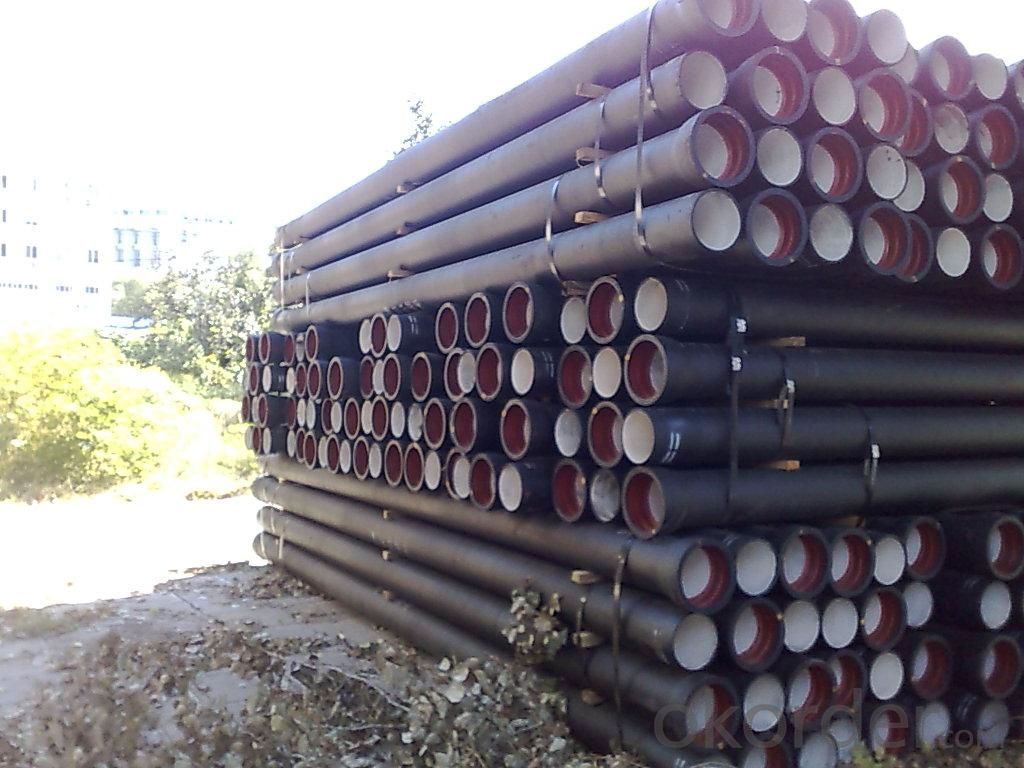
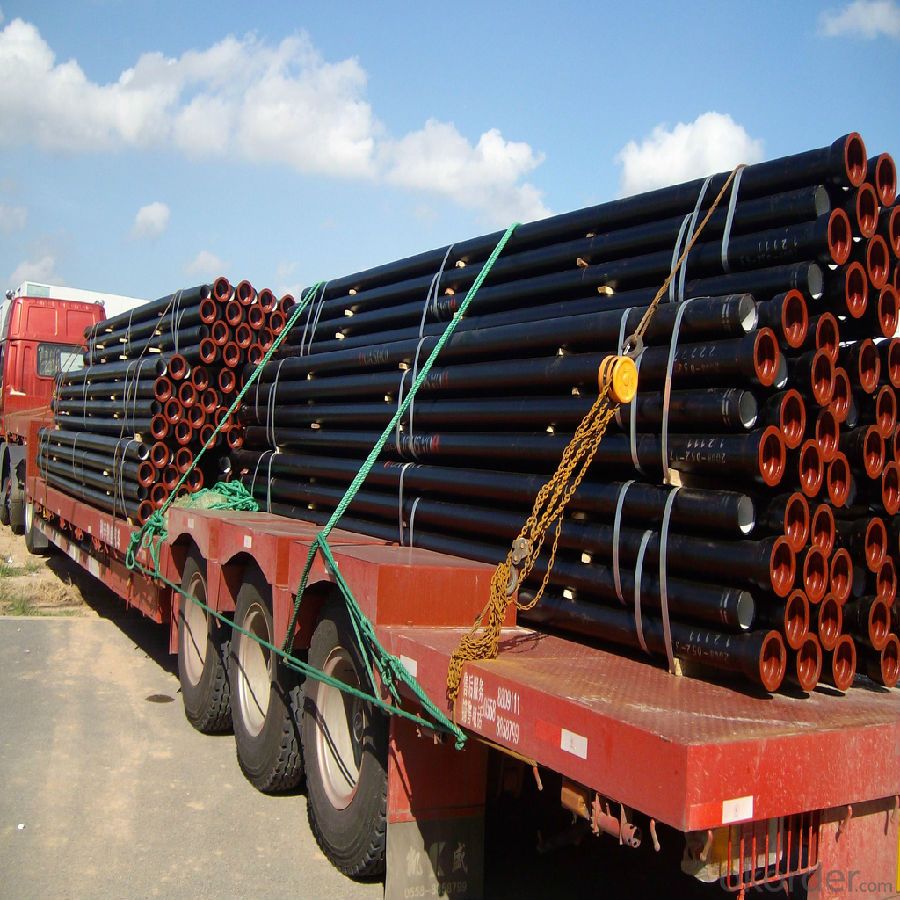
4. Ductile Iron Pipe Specification:
Standard: API SPEC 5L 44th eidtion,ASTM A252-98(2007)
Grade: A53 Grades A/B, ASTM A106 Grades B/C,ASTM A179
AWWA, C200, ASTM A139, ASTM A120, API 5L Grade B
X42, X52, X56, X60, X65, X70, X80, X100
Weld Alternatives: LSAW
OD size range: 6.4~44.5mm
Wall thickness: 406.4~1422mm
Length: 3 - 12 m according to requirment
Note: Other grade can also be provided after consulting. Special design are available
for coal slurry conveyance LSAW line tube -- Service
External coating: ductile iron pipes shall be externally coated with metallic zinc spray plus a further layer of resin painting to ISO8179.
Gasket: 100% SBR/NBR/EPDM rubber gasket in accordance with ISO4633.
Packing: ductile iron pipes from DN100 to DN300 be bundled with steel belts, others are in bulk.
Payment term: L/C, T/T.
Packing: In bulk vessel or in container
5.FAQ:
We have organized several common questions for our clients,may help you sincerely:
1.Q: Why would you choose ductile iron pipe rather than other pipe materials?
A:The reasons are obvious for that not only ductile iron pipe possesses the inherent strength and flexibility of ductile iron, combined with proven corrosion protection systems, but also the cost savings can be achieved from design to installation and commissioning.
2.Q:Why can you guarantee the inner of pipes can’t be corroded?
A: High alumina cement mortar lining and sulphate-resistant cement mortar lining. These two special linings are applicable to inner anti-corrosion for sewage pipes, improving resistance to erosion of the sewage components.
- Q: How do ductile iron pipes perform in acidic soil conditions?
- Ductile iron pipes perform well in acidic soil conditions due to their inherent corrosion resistance. The high carbon content and protective coating of ductile iron pipes make them less susceptible to corrosion from acidic substances in the soil, ensuring their durability and longevity.
- Q: Does centrifugal cast iron pipe work well with lining cement? Will it scale and breed bacteria?
- From the centrifugal ductile cast iron pipe with cement production process to analysis, the most core pipe by centrifugal molding, concrete water cement ratio, the centrifugal force, the coarse aggregate to the outer wall of the pipe and the pipe inside; because of fine aggregate and water removal, strength and wear resistance variation. When the inner wall of the pipe by long-term washing and soaking water, and inner wall wear and erosion, as the roughness increases, head loss increases, you will need to increase the pump lift, and operation cost for power consumption increases, also greatly increased.
- Q: How are ductile iron pipes installed?
- Ductile iron pipes are typically installed using a variety of methods, including trenching or open-cut excavation, horizontal directional drilling, and pipe bursting. In the traditional trenching method, a trench is dug to the required depth and slope, and the pipe is then lowered into place and joined using mechanical or push-on joints. Horizontal directional drilling involves drilling a pilot hole and then pulling the pipe through it, while pipe bursting involves breaking the existing pipe and replacing it with a new ductile iron pipe.
- Q: Ductile iron pipes perennial bubbles in the water will rot it
- Ductile iron pipes mainly called centrifugal ductile iron pipe, it has the properties of nature, iron and steel, excellent corrosion resistance, good ductility, good sealing effect, simple installation, mainly for municipal, industrial and mining enterprises, water supply, gas, oil etc..
- Q: Can ductile iron pipe be used for directional drilling?
- Yes, ductile iron pipe can be used for directional drilling. It is a strong and durable material that can withstand the stresses and forces encountered during directional drilling operations. Its flexibility and resistance to damage make it a suitable choice for this application.
- Q: How do ductile iron pipes handle thermal expansion and contraction?
- Ductile iron pipes are specifically designed to handle thermal expansion and contraction effectively. Due to their unique composition and structure, which includes graphite nodules in the iron matrix, these pipes have the ability to accommodate temperature variations without significant damage or distortion. The graphite nodules act as flexible joints, allowing the pipe to expand and contract without cracking or breaking. This characteristic makes ductile iron pipes highly resistant to the stresses caused by thermal fluctuations, ensuring their long-term durability in various temperature environments.
- Q: Can ductile iron pipes be installed outdoors?
- Ductile iron pipes can be installed outdoors.
- Q: Do ductile iron pipes require pressure testing before installation?
- Yes, ductile iron pipes do require pressure testing before installation. Pressure testing is a crucial step in ensuring the integrity and safety of the pipes. It helps to identify any leaks, weak spots, or defects in the pipes before they are put into service. Pressure testing involves subjecting the pipes to higher than normal operating pressures to check if they can withstand the expected pressure without any failure. This process helps to prevent potential issues such as leaks, bursts, or failures that could lead to water loss, property damage, or even accidents. Therefore, pressure testing is an essential requirement for ductile iron pipes to ensure their reliability and long-term performance.
- Q: How do ductile iron pipes perform in high-pressure applications?
- Ductile iron pipes are known for their exceptional strength and durability, making them highly suitable for high-pressure applications. These pipes are designed to withstand immense internal and external pressures, making them well-suited for underground or above-ground installations where high-pressure conditions are expected. One of the key advantages of ductile iron pipes in high-pressure applications is their ability to resist cracking or bursting. The inherent ductility of the material allows it to absorb and distribute the pressure evenly, minimizing the risk of failure under high-pressure conditions. This makes ductile iron pipes a reliable choice for water supply systems, oil and gas pipelines, and other applications where the pipe is subjected to significant pressure. Additionally, ductile iron pipes have excellent corrosion resistance properties, which further enhances their performance in high-pressure environments. The pipes are typically coated with a protective layer, such as cement mortar or epoxy, which acts as a barrier against corrosion. This protective coating prevents the formation of rust or scale inside the pipe, ensuring a smooth flow and maintaining the structural integrity even under high-pressure conditions. Furthermore, ductile iron pipes have a high tolerance for external loads, such as soil pressure, traffic loads, or other external forces. This strength enables them to withstand the additional stress that may be present in high-pressure applications, ensuring the long-term reliability and performance of the pipe system. Overall, ductile iron pipes offer exceptional performance in high-pressure applications. Their strength, durability, corrosion resistance, and ability to withstand external loads make them a reliable choice for various industries and infrastructure projects where high-pressure conditions are a concern.
- Q: How do ductile iron pipes compare to PVC pipes?
- Ductile iron pipes and PVC pipes are two common materials used for plumbing and water distribution systems. While both have their advantages and disadvantages, there are several factors to consider when comparing the two. Strength and Durability: Ductile iron pipes are known for their exceptional strength and durability. They have a high resistance to pressure and can withstand heavy loads, making them suitable for underground applications and areas with high traffic. On the other hand, PVC pipes are less sturdy and can be more vulnerable to cracking or breaking under extreme conditions. However, PVC pipes are resistant to corrosion and do not rust, which can be a significant advantage in certain environments. Installation and Maintenance: Ductile iron pipes are heavier than PVC pipes, making them more challenging to handle and install. They require specialized equipment and skilled labor to be properly installed. In contrast, PVC pipes are lightweight and easy to handle, making them simpler and quicker to install. Additionally, PVC pipes require less maintenance as they do not corrode or develop mineral deposits over time, unlike ductile iron pipes which may require regular cleaning and maintenance to prevent rust and sediment buildup. Cost: PVC pipes are generally more affordable than ductile iron pipes. The lower material and installation costs associated with PVC pipes make them a popular choice for residential and commercial plumbing projects on a budget. Ductile iron pipes, while offering superior strength and durability, tend to be more expensive due to the higher cost of materials, specialized installation requirements, and additional maintenance expenses. Environmental Impact: PVC pipes are made from plastic materials, which are derived from non-renewable resources and can have a negative impact on the environment during production and disposal. Ductile iron pipes, on the other hand, are made from recycled iron and have a longer lifespan, reducing the need for replacement and minimizing waste. However, it is worth noting that PVC pipes can be recycled, and many manufacturers have implemented sustainable practices to minimize their environmental footprint. In summary, ductile iron pipes and PVC pipes have distinct characteristics that make them suitable for different applications. Ductile iron pipes excel in strength and durability, making them ideal for heavy-duty applications, while PVC pipes offer cost-effectiveness, easy installation, and resistance to corrosion. Ultimately, the choice between the two materials depends on the specific requirements, budget, and environmental considerations of the project.
Send your message to us
Ductile Iron Pipe of China DN800 EN598 Hot Sale
- Loading Port:
- China main port
- Payment Terms:
- TT or LC
- Min Order Qty:
- 25 m.t.
- Supply Capability:
- 100000 m.t./month
OKorder Service Pledge
OKorder Financial Service
Similar products
Hot products
Hot Searches
Related keywords
